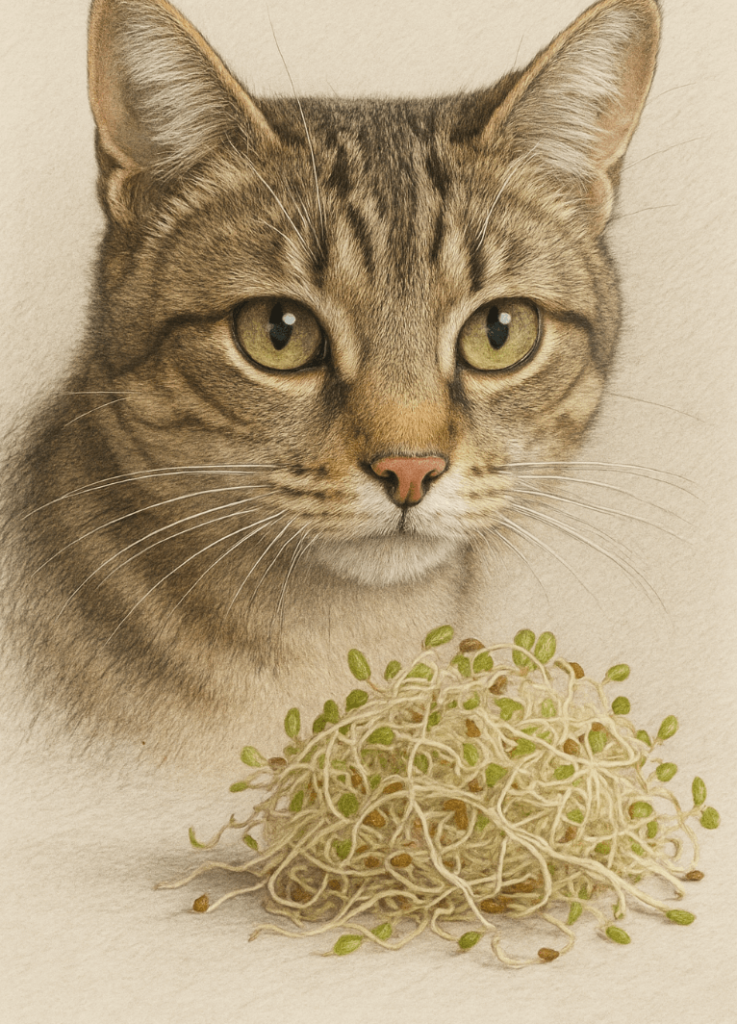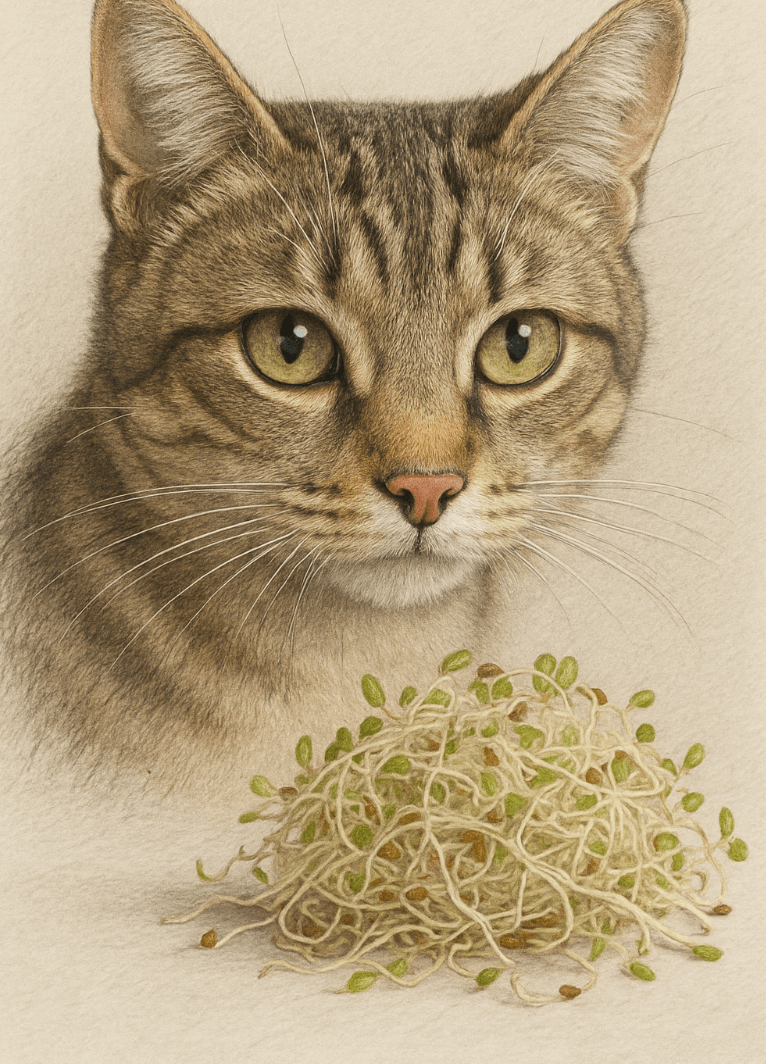Can Cats Eat Alfalfa Sprouts?
When it comes to feeding our feline friends, many pet owners are curious about whether certain human foods are safe for cats. One such food that often sparks questions is alfalfa sprouts. Known for their nutritional benefits in human diets, these tiny green sprouts might seem like a healthy snack, but are they suitable for cats? Cats have unique dietary needs as obligate carnivores, meaning their bodies are designed to thrive on animal-based proteins. However, some plant-based foods can be introduced occasionally if they’re safe and non-toxic. In this blog post, we’ll explore whether alfalfa sprouts are a safe treat for your cat, their potential benefits, and what precautions you should take before offering them.
Are Alfalfa Sprouts Safe for Cats?
Before sharing alfalfa sprouts with your cat, it’s important to understand whether they pose any risks or benefits. Here’s what you need to know about their safety for feline consumption.
Non-Toxic Nature:
Alfalfa sprouts are not toxic to cats, making them a safer option compared to other plants or human foods that could harm your pet.Low Calorie and Fat-Free:
These sprouts are low in calories and fat, which means they won’t contribute to unhealthy weight gain if given in moderation.High Fiber Content:
While fiber is beneficial for humans, cats don’t require much of it. Too much fiber can upset their digestive system.Potential Allergens:
Some cats may have sensitivities or allergies to new foods, including alfalfa sprouts, so introduce them cautiously.Risk of Contamination:
Alfalfa sprouts can sometimes carry bacteria like E. coli or Salmonella, which could be harmful to both cats and humans.
While alfalfa sprouts are generally safe, moderation and careful preparation are key to ensuring your cat’s health isn’t compromised.
Potential Benefits of Alfalfa Sprouts for Cats
Although cats don’t need plant-based foods to thrive, alfalfa sprouts do offer some minor benefits when offered sparingly. Here’s how they might positively impact your cat’s health.
Rich in Vitamins:
Alfalfa sprouts contain vitamins like K, C, and A, which support overall health, including bone strength and immune function.Antioxidant Properties:
The antioxidants in alfalfa sprouts help combat free radicals, potentially reducing inflammation in the body.Hydration Support:
These sprouts have a high water content, which can contribute to your cat’s daily hydration needs.Digestive Aid (in Small Amounts):
The fiber in alfalfa sprouts may aid digestion if your cat has occasional constipation, though excessive amounts can cause diarrhea.Variety in Diet:
Offering small amounts of safe, non-toxic foods like alfalfa sprouts can add variety to your cat’s diet without compromising nutrition.
While these benefits exist, they should be viewed as supplementary rather than essential to your cat’s primary carnivorous diet.
Check this guide 👉Can Cats Eat Cactus? Best 7 Expert Tips!
Check this guide 👉Can Cats Eat Coleslaw? Best 7 Expert Tips!
Check this guide 👉Can Cats Eat Swordfish? Best 7 Expert Tips!

Safe Human Foods for Cats | Foods to Avoid Giving Cats |
|---|---|
Alfalfa sprouts (in moderation) | Grapes and raisins |
Cooked plain chicken | Chocolate |
Pumpkin puree | Onions and garlic |
Blueberries | Raw dough or yeast |
Watermelon (seedless) | Alcohol or caffeinated beverages |
How to Safely Introduce Alfalfa Sprouts to Your Cat
If you decide to offer alfalfa sprouts to your cat, it’s crucial to do so safely to avoid any adverse effects. Follow these guidelines for a smooth introduction.
Start with Small Portions:
Begin by offering just a few sprouts at a time to gauge your cat’s reaction and prevent digestive upset.Wash Thoroughly:
Rinse the sprouts under cold water to remove dirt, pesticides, or potential contaminants before serving.Serve Plain and Unseasoned:
Avoid adding salt, spices, or oils, as these can irritate your cat’s stomach or be toxic.Observe for Reactions:
Watch for signs of vomiting, diarrhea, or allergic reactions after introducing the sprouts.Limit Frequency:
Treat alfalfa sprouts as an occasional snack rather than a regular part of their diet.
By following these steps, you can ensure your cat enjoys alfalfa sprouts safely without compromising their health.
Signs Your Cat May Not Tolerate Alfalfa Sprouts
Even though alfalfa sprouts are generally safe, some cats may not tolerate them well. Recognizing these warning signs will help you act quickly if something goes wrong.
Vomiting or Diarrhea:
These symptoms indicate that your cat’s digestive system is struggling to process the sprouts.Loss of Appetite:
Refusal to eat or disinterest in food may signal discomfort or illness caused by the sprouts.Excessive Drooling:
Drooling could suggest irritation in the mouth or throat from consuming the sprouts.Lethargy or Weakness:
A sudden lack of energy might indicate an underlying issue triggered by the new food.Swelling or Itching:
Swollen paws, face, or excessive scratching could point to an allergic reaction.
If you notice any of these signs, stop offering alfalfa sprouts and consult your veterinarian promptly.
Common Mistakes to Avoid When Feeding Alfalfa Sprouts
Feeding alfalfa sprouts to your cat requires attention to detail to avoid mistakes that could harm their health. Here are some pitfalls to steer clear of.
Overfeeding:
Giving too many sprouts can lead to digestive issues like gas or diarrhea. Stick to small portions.Using Seasonings or Additives:
Salt, pepper, or dressings can irritate your cat’s stomach and should never accompany alfalfa sprouts.Ignoring Contaminants:
Failing to wash the sprouts thoroughly increases the risk of bacterial infections like Salmonella.Forcing Consumption:
If your cat shows no interest in alfalfa sprouts, don’t force them to eat—it’s simply not their preference.Skipping Veterinary Advice:
Before introducing new foods, always check with your vet, especially if your cat has existing health conditions.
Avoiding these mistakes ensures a safer experience for your furry friend.
Alternatives to Alfalfa Sprouts for Cats
If alfalfa sprouts don’t suit your cat or you’re looking for other safe snacks, here are some alternatives to consider.
Cooked Plain Chicken:
High in protein and easily digestible, cooked chicken is a favorite among cats.Pumpkin Puree:
Rich in fiber, pumpkin puree helps regulate digestion and can alleviate constipation or diarrhea.Blueberries:
Packed with antioxidants, blueberries make a tasty and nutritious treat in small amounts.Watermelon (Seedless):
This hydrating fruit is refreshing and safe for cats, provided it’s served without seeds or rind.Green Beans:
Low in calories and high in fiber, green beans can be a healthy addition to your cat’s diet.
These alternatives cater to your cat’s carnivorous nature while providing variety and nutrients.
Understanding Your Cat’s Dietary Preferences
Cats are naturally selective eaters, and understanding their preferences can guide you when introducing new foods like alfalfa sprouts.
Strong Preference for Protein:
Cats instinctively seek out meat-based foods because their bodies require taurine and other amino acids found in animal products.Curiosity Toward New Textures:
Some cats may try alfalfa sprouts simply because of their unique texture, even if they don’t fully enjoy the taste.Limited Interest in Plant-Based Foods:
Unlike dogs, cats lack the enzymes needed to efficiently digest plant matter, so they’re less likely to crave vegetables.Sensitivity to Changes:
Sudden dietary changes can upset their stomach, so gradual introductions are always recommended.Individual Variations:
Every cat is different—some may nibble on sprouts eagerly, while others may completely ignore them.
By respecting your cat’s instincts and preferences, you can tailor their diet to meet their unique needs.
Frequently Asked Questions About Cats and Alfalfa Sprouts
How much alfalfa sprouts can I give my cat?
Limit servings to a few sprouts once or twice a week, as larger quantities may upset their stomach.
Can kittens eat alfalfa sprouts?
Kittens have sensitive digestive systems, so it’s best to avoid giving them alfalfa sprouts altogether.
Do cats enjoy the taste of alfalfa sprouts?
Some cats may nibble on them out of curiosity, but others might ignore them due to their preference for meaty flavors.
What should I do if my cat eats too many alfalfa sprouts?
Monitor for signs of digestive distress and contact your vet if symptoms persist or worsen.
Are store-bought alfalfa sprouts safe for cats?
Yes, as long as they’re thoroughly washed and free from mold or contamination.
Final Thoughts on Feeding Alfalfa Sprouts to Cats
While alfalfa sprouts aren’t toxic and can provide minor nutritional benefits, they aren’t a necessary part of a cat’s diet. As obligate carnivores, cats thrive on protein-rich foods, and plant-based snacks should only supplement their meals in moderation. By introducing alfalfa sprouts cautiously and observing your cat’s response, you can determine whether they’re a suitable occasional treat. Always prioritize your cat’s health and consult your veterinarian if you’re unsure about adding new foods to their diet. Remember, a happy and healthy cat starts with a balanced and species-appropriate diet.
Do Cats Have Taste Buds? Best 7 Expert Tips! – Discover how cats experience flavors and why their taste is so unique.
Do Dogs Have Taste Buds? Best 7 Expert Tips! – Discover how dogs experience taste, their preferences, and what it means for their diet and health.
Can Cats Taste Sweet? Best 7 Expert Tips! – Discover why cats can’t taste sweetness, how it affects their diet, and tips to keep them healthy and happy.
Can Dogs Taste Sweet? Best 7 Expert Tips! – Discover how dogs perceive sweetness, which foods are safe, and tips to manage their sweet cravings responsibly.





